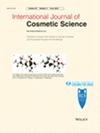Insights into structural and proteomic alterations related to pH-induced changes and protein deamidation in hair
Abstract
Objectives
The hair shaft is often exposed to shampoo and haircare products that have unknown or varying pH levels. These products contain a combination of surfactants and other active ingredients to treat the hair or the scalp. As amphoteric proteins, hair keratins have limited buffering capacity, so variations in pH can have multifaceted impacts on them. However, there is limited knowledge about how pH affects keratins and keratin-associated proteins (KAPs). Therefore, this study aims to examine the effects of varying pH levels (pH 3–pH 12) on hair structure and analyse consequent alterations in the hair proteome using mass spectrometry-based proteomics.
Methods
A scanning electron microscope was used to examine changes in hair-shaft morphology due to exposure to various pH levels, while mass spectrometry was employed to analyse protein alterations.
Results
We found that exposing the hair shaft to varying pH levels led to specific effects on the cuticle, including cuticle lifting at certain pH levels, while proteomics analysis identified alterations in the hair proteome along with significant deamidation of keratins types I and II and KAPs. More pronounced effects were observed at extreme acidic conditions (pH 3) and alkaline conditions (above pH 8) on both hair morphology and hair proteins. pH levels between pH 5 and pH 7 had minimal impact on hair structure and proteins, suggesting that haircare products with pH in this range are ideal for hair-shaft health. In contrast, alkaline pH levels were found to negatively affect hair.
Conclusions
The structure evaluation and proteomics data emphasize the critical role of pH in hair health. The extreme acidic or alkaline pH impacts the hair structure and hair proteins. The study highlights the optimal pH range for maintaining healthy hair.


 求助内容:
求助内容: 应助结果提醒方式:
应助结果提醒方式:


